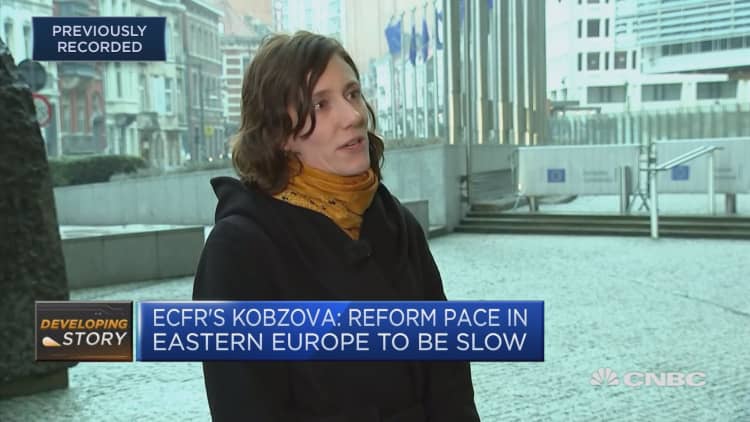Germany has sent out mixed messages over its relationship with Russia in recent weeks, showing how carefully the country feels it needs to tread so it doesn't alienate a neighbor and key trading partner.
While the country recently joined with other global powers in condemning an attack on a former Russian double agent who was poisoned, along with his daughter, in the U.K. at the start of March, it has also tried to keep the peace diplomatically.
German Chancellor Angela Merkel, who grew up in Communist East Germany and is a fluent Russian speaker, sent congratulations to Russian President Vladimir Putin on Monday after his latest election win, despite the vote being seen as lacking real political plurality and riven with irregularities.
The mixed messages come as European Union leaders meet in Brussels on Thursday, where there is an expectation that leaders will again express solidarity with Britain after the attack, which saw a Russian-made nerve agent used on British soil.
European Council President Donald Tusk called on his peers to express solidarity with Britain at the summit and Merkel appeared to express such sentiment on Wednesday. She told German lawmakers that the bloc must recognize evidence pointing towards Russian collusion in the attack and that the EU address its future relationship with its powerful neighbor.
"I would be happy if I didn't have to name Russia here, but we can't ignore evidence just because we don't want to call out Russia. That's no way to operate," Merkel told the Bundestag on Wednesday ahead of the EU Council meeting.
High stakes
Jana Kobzova, associate fellow at the European Council on Foreign Relations think tank, told CNBC Thursday that Merkel's speech showed solidarity with the British, but that it wanted to preserve good relations with Russia too.
"Moscow is watching very closely what Berlin is saying about the attack. (This is also about) the other side of Germans' relation with Russia which has always been the one that's a bit more complicated, a bit more willing to embrace and understand what's happening rather than to punish," she said.

"This has been the case for a number of years and it's related to history and economic relations. But it has complicated European efforts to come up with a bold response to Russia when it comes to Russian hybrid warfare or Russian activities in a number of countries," she added.
Germany has a lot at stake if its relationship with Russia turns too sour with trade a big boon for Germany.
In fact, despite international sanctions on Russia for its annexation of Crimea and perceived role in a pro-Russian uprising in Ukraine, trade between Germany and Russia grew dramatically in 2017, data shows.
According to Germany's Federal Statistical Office, German exports to Russia in 2017 rose by more than a fifth over 2016.
In the first 11 months of last year, German companies sold 24.1 billion euros ($29.6 billion) worth of goods to Russia, with demand for machinery and cars being especially strong. This was 21 percent higher than in 2016.
The statistics office said 2017 marked the first increase in exports since 2012 when exports amounted to 38 billion euros "before they started shrinking on the back of an economic slump in Russia" compounded by the sanctions.
Meanwhile, German imports from Russia increased by 19 percent in the first 11 months of 2017 to 28.6 billion euros. This was mainly due to increased demand for Russian natural gas and crude oil.
Soccer and gas
The momentum of positive trade between Russia and Germany is expected to continue into 2018 due to the World Cup soccer competition being held in Russia this summer.
The head of the German-Russian Chamber of Commerce (AHK) told German state broadcaster Deutsche Welle in February that a large number of German companies are "helping to provide vehicles, machinery and chemical products for the building projects surrounding the sporting events."
Germany needs to play carefully on the energy front too with Europe still largely reliant on Russia for its gas, much to the consternation of a number of EU member states that fear Russia could use its gas supply as a bargaining chip with Europe.
Still, despite reservations, Germany backs the building of a gas pipeline called Nord Stream II that would double gas supplies from Russia to Germany (one of Russia's biggest customers for gas). To be built by the world's largest gas company, Russia's Gazprom, the $11 billion pipeline will directly connect Germany and Russia with a pipe under the Baltic Sea. In February, Merkel said the pipeline did not pose a threat to energy diversification.
"We think this is an economic project," she said in February , Reuters reported, after meeting with Poland's prime minister, who has expressed concerns over the pipeline. "We are also for energy diversification … We believe Nord Stream poses no danger to diversification," she said.


